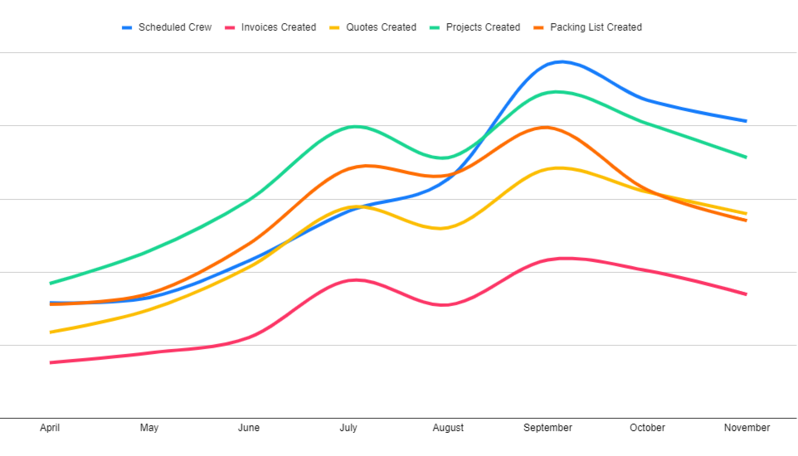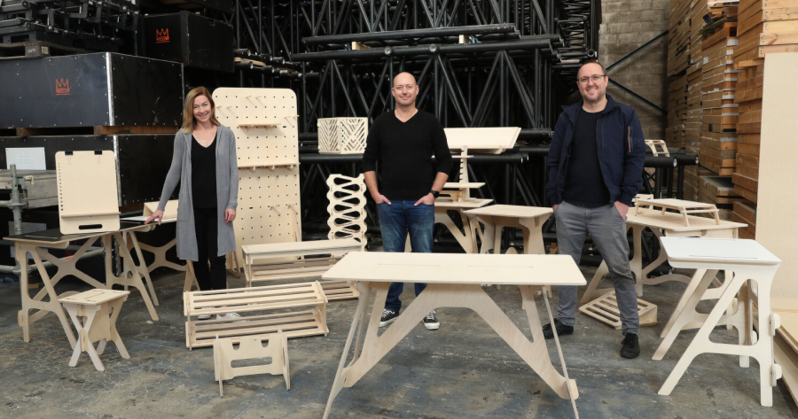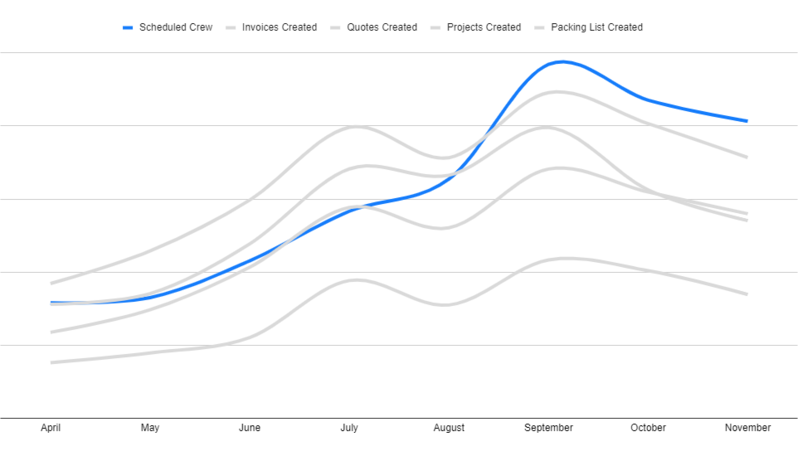It’s safe to say, no other year in our lifetime has been like 2020. We have seen and heard of the many challenges companies have faced during Covid-19.
As a software provider for AV and live event suppliers, we’ve experienced firsthand the impact of Covid-19 on our industry. With more than 50,000 users across 70 countries, our data and daily conversations with users have allowed us to see the global impact on activities for the industry. What was the initial response from companies? Were companies able to keep afloat? Are there any longer lasting effects for companies after COVID-19?
We want to share some of these global trends with you and what we expect to see in 2021. The trends we share rely on activity indicators in our software such as creating packing slips, call sheets, quotes and invoices, as well as, planning crew.
Please note, we are not able to look at individual accounts or user data, only the average values of activity within the software.

First Wave – Global industry shock
The first wave of COVID-19 was a hard hit for many companies. When restrictions around events were first introduced in March, we immediately saw activities drop to roughly two-thirds the normal level. However, there were still many quotes being created which gave us the indication that companies were still planning ahead with the belief that the restrictions would be a temporary problem.
This view turned around in April. With little perspective and much confusion regarding government support, many companies were forced to cancel their accounts, in most cases because of bankruptcy. Among the companies that were able to survive, many downgraded their accounts due to redundancies of staff.
Finding new revenue sources
As the first wave continued and more countries went into lockdown, we expected to see activity decreasing even more. However, this didn’t happen. Instead, we saw activities, such as packing and call sheet creation, start to rise slowly. This rise came from companies finding or growing other revenue streams like live streaming, broadcasting services, and installations. These revenue streams heavily increased in demand as a large part of the workforce moved to work remotely. We also witnessed how innovative our industry can be, with new initiatives to help out governments, healthcare, and home-workers.

Smaller-scale projects
This shift in revenue streams along with the restrictions on large events also caused a change in the type of projects being planned. Event production businesses seemed to move away from planning complex, multi-day events to executing smaller-scale projects with fewer resources planned.
The Second Wave - Resilience of the industry
Springtime showed us just how quickly the global event industry could come to a sudden halt. It took some time, but over the summer months, activities and confidence slowly started rising again. The number of created packing lists, call sheets, quotes, and invoices being generated were three times higher compared to April.
In September, our users saw their busiest month since COVID-19 restrictions were introduced in the spring. More knowledge of the virus, safer ways to conduct business, and fewer government restrictions helped planning activities to grow.
Europe entered its second period of lockdown in October. We saw this reflected in the decrease of activity numbers. However, the decline was less drastic than the one we had witnessed in the first wave. More knowledge on how the virus spreads gave way to more small-scale events being allowed during partial lockdown periods. While most companies probably did not make a profit, the smaller events helped companies keep their heads above water.
Government responses important for market stability
Another differentiating factor for how COVID-19 impacted companies in different countries were government responses. In countries where there was a lot of uncertainty about government support, we witnessed more cancellations and accounts being put on hold.
Out of the 70 countries we have users based in, we saw the most stability in Germany. German event professionals managed to get more done with a larger support fund from the government and much earlier exceptions for events in the national policy. For example, during the early months of the COVID-19 pandemic and its restrictions, Germany announced a €550 billion package that would also help the music and creative industries — the biggest aid package in the country’s post-war history. By far, this was one of the largest aid packages offered to companies affected by COVID-19 in Europe.
As a result, Germany was the market that remained the most stable in terms of activity and with fewer cancellations. This highlights how important it is for local governments to react quickly, provide monetary relief and offer perspective for affected companies. Something we witnessed around the world when event professionals called for support in various initiatives. A cause that we supported and actively participated in.
Crew was hit the hardest
There’s no doubt that Covid-19 has left a lasting impact on the industry. While we’re happy to see that many companies are still operational, the same can sadly not be said for a lot of individuals working in our industry. We have seen and heard from many professionals in the industry that finding jobs has become significantly harder. Some have even had to turn to other industries or jobs just to stay afloat.
We can certainly see this impact in the numbers. Crew planning in Rentman is still only at 25% of what it once was. With ongoing restrictions on large events, many projects being planned are much smaller in scale and therefore do not require a lot of staff or freelancers. This has greatly reduced the crew planning activities in Rentman overall as well.
Downtime has not been wasted
In every cloud, there is a silver lining. While this has been a very dark moment for the industry, we have also witnessed some positive trends that could be beneficial for companies and the industry as a whole. Apart from establishing new business services like live streaming and broadcasting services, companies also invested in improving their processes and organization.
Adopting new cloud solutions
Cloud software became a must-have during remote working so teams could keep up with changes and communicate more easily — this required software changes for some businesses.
For other businesses, we saw this slow period finally give them the opportunity to implement new software. We saw larger companies (over 20 office employees) take the time to renew their business and update their inventory with new software. Larger companies typically have longer software procurement and implementation processes. For this reason, Rentman’s growth was previously among mostly smaller companies.
Optimizing business processes
We also saw our existing customer base use this time to learn new processes in Rentman. Many companies used the downtime to improve workflows. This was visible in the number of participants we saw in our Rentman training webinars in May and August. As part of these improved workflows, we witnessed a higher adoption of companies serializing their equipment. This optimized process enables these companies to have more insights into the future of their equipment usage.
Similar adoptions happened with crew scheduling as well. Typically, planning crew is a process that is very labor-intensive due to the use of multiple communication tools and a lot of back-and-forths. While the number of projects being planned was going down, we witnessed a relative growth in the adoption of crew scheduling features. This rise was due to the fact that more companies adopted the crew scheduling and communication options in Rentman.

What we can expect from 2021
Expect a more organized way of working
Time has long been the major limiting factor that held companies back from streamlining certain parts of their operations. With a lot of forced downtime in 2020, we saw that more and more companies in the industry took this time to improve their processes. Whether that means implementing a new software solution or simply automating existing processes, companies who used this time to improve will be even more ready for the busy season once events are back in full force.
Healthier rates for some markets
Prior to Covid-19, there was a surplus of supply on the market within the industry. Of course, this surplus does vary per region or country. In areas where the surplus existed, this made rates more competitive but not as profitable for certain companies. Now due to bankruptcies and redundancies, we expect to see healthier rates in the future.
Quality staff will be a crucial differentiator
We mentioned above that crew scheduling is still a fraction of what it once was. We see and hear that crew are leaving companies due to redundancies or just no work and pay. Many crew still need to make a living and have had to turn elsewhere to use their skills. The distinctive character of your business really lies within your staff and freelancers will be more and more difficult to obtain in the future.
Experiments and vaccines give hope
Back in August, German pop singer Tim Bendzko performed to a venue of about 1,400 people. It was part of a study by researchers called Restart 19 and helped track the risks of Covid-19 when in large indoor events. We know that here in the Netherlands there are also plans to host “pilot events” so that the safest way can be determined to open larger events back up again. Hopefully, some positive results can pave the way for more events taking place in a controlled setting.
Additionally, the end of 2020 brought some light to a dark year with the announcement of multiple effective vaccines against COVID-19. With the UK and US already starting vaccinations and the rest of Europe hoping to follow close behind, we hope that 2021 can provide more resources and safer rules for larger events to take place once again.
Fighting for industry visibility
We must continue to fight for industry visibility and local initiatives for government support in the future. We already saw with data how countries with more robust government support were able to maintain more stable activity levels. By fighting for support, we can hope to minimize some of the above impacts mentioned on the industry.
Rentman previously has been able to play a role in bringing companies together for this cause. We are very much in favor of local initiatives such as the VTTE (the association of technical event suppliers in the Netherlands). Check out what local associations or organizations you can join to help. Together we are stronger.

